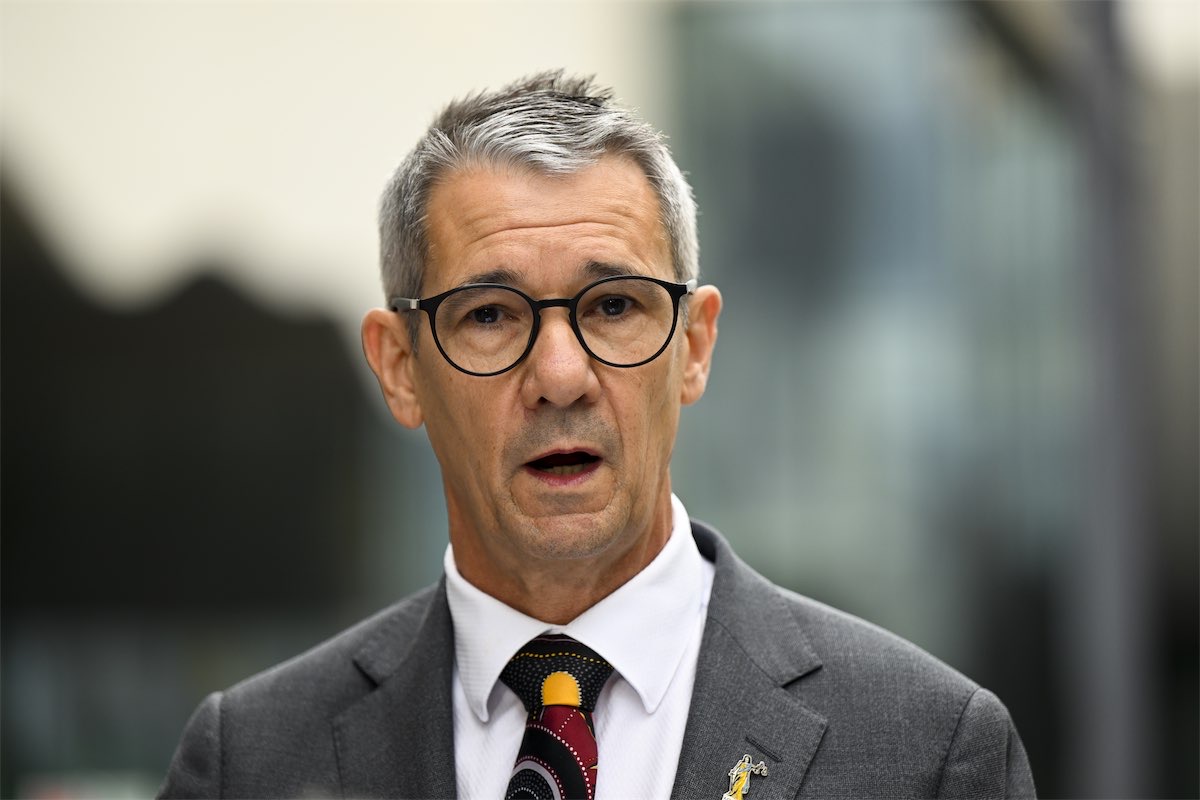
Beyond the daily news coverage, “CityNews” legal commentator and former barrister HUGH SELBY is commentating regularly on the Sofronoff Inquiry’s public hearings, focusing upon the advocacy and witness performances.
The Board of Inquiry, led by Commissioner Walter Sofronoff KC, a former president of the Queensland Court of Appeal, was established by the ACT government in December to examine how police, prosecutors and a victim support service handled allegations made by Brittany Higgins against her former colleague Bruce Lehrmann.
Dear Director,
AT the end of four days of evidence it is useful to all of us watching your witness journey to reflect upon progress.

For 20-odd years you have devoted your working life to being a learned, effective trial prosecutor and appellate advocate. You have risen through the ranks of the ACT DPP office, becoming the first internal appointment as Director.
Unlike three of your predecessors, as Director you had little experience as a defence trial advocate.
Along the way you were awarded a Churchill Fellowship to study restorative justice approaches among indigenous communities outside of Australia. That you wanted to do this research shows your commitment to considering fresh ideas and methods for our criminal justice system.
You have spent this week as a witness at an inquiry that is looking into the conduct of the investigation and trial that followed allegations by Ms Higgins against a fellow parliamentary staffer.
You were the first witness and, as you said, being a witness is an unfamiliar experience for you, as it is for most advocates. Unlike witnesses at a trial, civil or criminal, you did not have the “settle into the role” advantage that questioning by your advocate as examination-in-chief usually allows.
Nor did you have the chance, as you would as a witness at a conventional trial, to make concessions – if you and your advocate considered it appropriate – that would mitigate likely lines of critical questioning from other advocates.
Instead, you were thrust into immediately defending your actions as Erin Longbottom KC, counsel assisting the inquiry, proceeded methodically and thoroughly to confront you with documents of all kinds and from a variety of sources, that were the written records of what you did during the Higgins saga.
Self-defence a hard test… responses measured and sincere
Your self-defence was a hard test. You have managed, as many of us would not, to retain your composure hour after hour, day after day. Your responses have been measured and sincere. You feel that you acted appropriately, given the extraordinary situation within which you were acting.
Central to your explanations as to why you acted contrary to practices well known and well understood by you (such as defence access to witnesses) was your perception of the need to be focused upon the well-being of Ms Higgins in an extraordinary situation.
Part of that extraordinary situation was the inclusion in the police brief of inadmissible counselling notes. That brief was served directly by the police on the defence instead of the usual practice of first going to the DPP. There were other events, both before and at trial, that led you to a state of mind that the proper pursuit of a just outcome (as you saw it) was being jeopardised.
It was with those “perceptions” that you wrote to the police in early November making serious allegations. Contrary to your own knowledge and experience, you raised these allegations in the absence of real evidence to support them. What you had were subjective concerns.
On day four (Thursday) you conceded that the disclosure of those counselling notes was likely an error, without sinister overtones. You also conceded that, now better informed, you do not think that the police were subject to political interference. You were emphatic that you were not subject to any such interference.
By the end of day four, responding to the AFP advocate’s cross examination, it seems clear that the police had not adopted a “do not proceed to charge” approach at a critical late March meeting. This is contrary to your allegation in November.
Such is the healing nature of the passage of time and the distance from the helter skelter that was the Higgins saga.
Police conclusions ‘were too passionately held’
On your fourth day as a witness your advocate, Mark Tedeschi KC, questioned you so as to let you enlarge and better explain your approach on some key issues.
For example, your disquiet about “credibility issues” raised by the police during their pre-charge investigation. This led to other advocates pointing directly to how “credibility” is an active component of a decision to charge and later to go to trial. Other advocates also peppered Mr Tedeschi’s questions with numerous objections.
You felt that the police approach to assessing the evidence was “outmoded” and their conclusions “were too passionately held”. Interestingly, you accuse an experienced police officer or officers of losing objectivity for holding strong views that there should be no charge.
It seems that you think that, by contrast, you were both objective and had no “confirmation bias” in wishing to go to trial. You hold that view despite the knowledge that the jury was deadlocked prior to the misconduct event that led to its discharge. Your repeated view over two days was that the jury would have convicted but for one hold out. That is speculation dressed up as authoritative: it is not an evidence-based assertion.
You were taken to the written statements by a number of police as to the test they apply when deciding whether to charge. There were a variety of expressions for the test used, some convoluted. You agreed that “for some considerable time” you have been aware of “problems” in the tests being used by police to decide to charge or not to charge. Given your mastery of prosecution principles, this is an issue upon which your views must be influential in guiding “best practice” by both police and lawyers.
Viewed from the outside, and with the great value of hindsight, you could have expressed yourself differently in your November letter; for example, raising what your saw as concerns and asking if they could be quickly allayed at a meeting. That would have achieved “doing something” safely. It might even have meant that there was never any public inquiry and no public dissection of your conduct.
Together with your primary concern for the well-being of the complainant was your disquiet about the lack of support by police for your determination to go to trial. In your mind, it seems, the police should be supportive of your decision – whether they agree with it or not.
Police will make clear why they laid the charge
An interesting byway in this saga is that the police did charge. You did not have to proceed directly, without police charging, using your power to bring an “ex officio” indictment to the court.
No doubt later evidence to the inquiry from police will make clear why they laid the charge. That evidence may already be set out in the documents.
Kate Richardson SC, advocate for the AFP, cross-examined you with fast, mostly tight but sometimes oh-so-long questions. She signposted each topic so you and we knew what was coming.
She took you to the Collaborative Agreement between your office and the AFP. Then to the Prosecution Policy, which sets out the “reasonable prospects of conviction” plus “public interest served by prosecuting” approach. She pressed you on the plain meaning of that policy. She pressed you on your role to advise the police on the admissibility of material they have gathered.
She also pressed you on advising of “likely lines of defence”; for example, if there were inconsistencies in disclosure (presumably by a complainant). The Commissioner intervened and pointed to the additional criterion of “likely effect upon the fact finder” and noted how a reliable investigator’s view about a witness as a likely liar might be useful to that issue.
You agreed with her that the pursuit of exculpatory evidence by police is just as important as seeking inculpatory evidence. She raised with you that the police told you, at a critical meeting, that their investigation was ongoing. There was more to be done. It was too early to determine to charge. You agreed, but your perception was that they wanted you to stop the investigation.
There’s a mismatch there, between what the police said and your perception then of what was going on.
It was a long day. By the end of it both witness and cross-examiner were going round and round. We will all be better informed by this time on day five.
Author’s notes on his inquiry commentary
A well-run public inquiry is like an iceberg: what you see at the public hearing is just the tip of a much larger “work in progress”.
For some months the inquiry staff have been interviewing people and collecting records. All that information is then available to the inquiry advocates (counsel assisting), ammunition to fire or soothing lotion to apply when asking a witness questions.
Woe betide the witness who, waiting for the questions, sees only the counsel assisting. This is not a one-on-one contest: counsel assisting is just the public face of concerted team work.
In recent public inquiries into, for example, the suicide of our Defence Forces’ veterans, or victims of institutionally based sexual predators, the “soothing” element has been a focus with those witnesses who were victims or victim’s relatives.
But among those witnesses who might have strayed and who might be publicly exposed, “hope” springs eternal until it’s too late even to save some dignity. Even when they know what is in the advocate’s gun they hope for a misfire. One must first deceive oneself before deceiving others.
For any witness there is the added problem that the commissioner can ask as many questions as they like. This does not happen in court proceedings where the judge is seen but little heard.
At any moment the commissioner may intervene in the to and fro between witness and advocate. Here one can see how the public interest is served by appointing as commissioner someone who was a skilled advocate earlier in their career.
My bad dream, even in retirement, is being a witness at a public inquiry who is being led gently or pushed ruthlessly by counsel assisting, and then suddenly being engaged by a commissioner who knows how to cross-examine.
Cross-examination is an art, reflecting at least two of the following: innate temperament, experience, and good mentoring. Above all else it is manipulative. It suggests the inevitable conclusion to the listener without stating it. The listener takes themself to the finish line. As a witness, to fight on two fronts against well provisioned, skilled opponents is a nightmare.
All that being noted we must keep in mind that the commissioner opened the public hearings with this significant comment: Nobody should be harmed unnecessarily.
–HUGH SELBY
Who can be trusted?
In a world of spin and confusion, there’s never been a more important time to support independent journalism in Canberra.
If you trust our work online and want to enforce the power of independent voices, I invite you to make a small contribution.
Every dollar of support is invested back into our journalism to help keep citynews.com.au strong and free.
Thank you,
Ian Meikle, editor





Leave a Reply